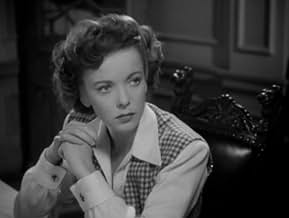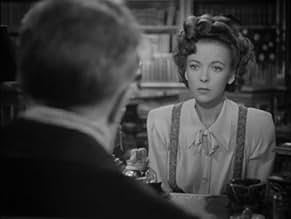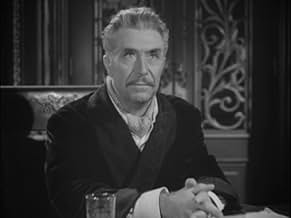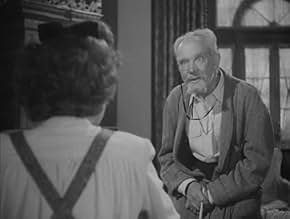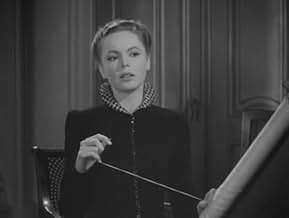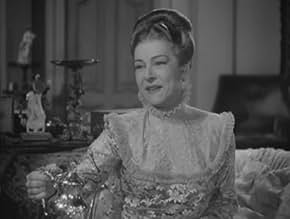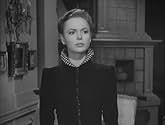A young woman traveling to Poland with her employer meets a count, and they fall in love as World War II begins.A young woman traveling to Poland with her employer meets a count, and they fall in love as World War II begins.A young woman traveling to Poland with her employer meets a count, and they fall in love as World War II begins.
Alla Nazimova
- Zofia Orwid
- (as Nazimova)
Harry Adams
- Ballet Attendee
- (uncredited)
Alex Akimoff
- Wine Seller
- (uncredited)
Sylvia Arslan
- Naneczka
- (uncredited)
Lynn Baggett
- Friend of Count Orvid
- (uncredited)
George Blagoi
- Polish Peasant
- (uncredited)
John Bleifer
- Wladek
- (uncredited)
Paul Bradley
- Ballet Attendee
- (uncredited)
Cyd Charisse
- Ballerina
- (uncredited)
Gino Corrado
- Peasant at Party
- (uncredited)
- …
Julius Cramer
- Polish Diplomat
- (uncredited)
Jane Crowley
- Party Guest
- (uncredited)
- Director
- Writers
- All cast & crew
- Production, box office & more at IMDbPro
Featured reviews
A bit slow moving but nonetheless interesting. The only thing missing is Maria Ouspenskaya stirring a boiling cauldron.
Paul Henried and Ida Lupino fall in love near Warsaw. She's a British commoner employed by a fancy English antique collector. Paul and Ida meet by accident in an antique shop. After they do some innocent and tender kanoodling for a while, Paul decides to bring Ida home to meet the Fockers...oops...I mean the royal Orvid family.
Only philosophical uncle Leopold Baruta likes Ida. Paul's sister,Janina, hates her while the rest of the Orvids think she's not good enough for Paul. In the meantime, we encounter a guy who's supporting them all-- Count Pavel. The reason why he's a Count is because everyone watches him count his money to then disperse to them as monthly stipends.
Count Pavel is also a representative of Poland to Nazi Germany and he's convinced that, after Czechoslovakia, Hitler had no more territorial designs on Europe so it would be a good idea to give him the Polish Corridor so as not to tick him off into attacking Poland.
Ida begins to dislike the whole Orvid family and especially Paul's reliance on Pavel for dough. So she's about to hop a train to get her back to England when Paul promises to become independent and she buys into it. So they marry, start teaching the peasants how to till the land while Pavel seethes because this is no way for Polish nobility to act.
On Sept,1.1939, the Nazis invade Poland and begin bombing Warsaw. Paul puts on his military uniform and heads for battle. Ida is left home and somehow, she rallies the peasants into fighting the Germans which history proves to be an absurdity. She teaches them the "scorched earth" policy which history teaches was anachronistic because it was the Russians who employed it against the Nazis after 6/22/41.
However despite its flaws,it all makes for an interesting anti-Nazi, morale boosting film for us at home.
Paul Henried and Ida Lupino fall in love near Warsaw. She's a British commoner employed by a fancy English antique collector. Paul and Ida meet by accident in an antique shop. After they do some innocent and tender kanoodling for a while, Paul decides to bring Ida home to meet the Fockers...oops...I mean the royal Orvid family.
Only philosophical uncle Leopold Baruta likes Ida. Paul's sister,Janina, hates her while the rest of the Orvids think she's not good enough for Paul. In the meantime, we encounter a guy who's supporting them all-- Count Pavel. The reason why he's a Count is because everyone watches him count his money to then disperse to them as monthly stipends.
Count Pavel is also a representative of Poland to Nazi Germany and he's convinced that, after Czechoslovakia, Hitler had no more territorial designs on Europe so it would be a good idea to give him the Polish Corridor so as not to tick him off into attacking Poland.
Ida begins to dislike the whole Orvid family and especially Paul's reliance on Pavel for dough. So she's about to hop a train to get her back to England when Paul promises to become independent and she buys into it. So they marry, start teaching the peasants how to till the land while Pavel seethes because this is no way for Polish nobility to act.
On Sept,1.1939, the Nazis invade Poland and begin bombing Warsaw. Paul puts on his military uniform and heads for battle. Ida is left home and somehow, she rallies the peasants into fighting the Germans which history proves to be an absurdity. She teaches them the "scorched earth" policy which history teaches was anachronistic because it was the Russians who employed it against the Nazis after 6/22/41.
However despite its flaws,it all makes for an interesting anti-Nazi, morale boosting film for us at home.
Ida Lupino and Paul Henreid both were very good actors, but very often they were either cast as either supporting actors or starred in smaller and less prestigious films. Here, however, Warner Brothers put both of them in a top film and gave them both a chance to shine--and they were more than up to the task. In particular, Lupino was lovely. Her performance was strong but also with a lot of style--she really was in her element here.
The film begins in the mid-late 1930s in Poland. Ida and her boss (Mary Boland) are visiting the country to buy antiques to take back to Boland's business in England. Shortly after the story begins, a local nobleman (Henreid) meets Lupino and is obviously smitten with her. When he asks her to marry him, there is a bit of a scandal within the family--after all, she is just a commoner. This romance and its repercussions make up the first 2/3 of the film.
At the same time, there are small hints here and there about the upcoming invasion of Poland by the Nazis--something with which audiences of 1944 would have been well acquainted. Eventually, the Nazi hoards invade and Henreid is called to active duty and the inevitable conquest begins.
Overall, there is a lot to like about this film. As I said above, the acting is very, very good. Plus, Henreid and Lupino are ably assisted by various supporting actors that also rise to the occasion. The direction and cinematography are also first-rate. These factors, combined with a good story, make for a very good film--a propaganda film with greater depth than usual and which is still very watchable today.
The film begins in the mid-late 1930s in Poland. Ida and her boss (Mary Boland) are visiting the country to buy antiques to take back to Boland's business in England. Shortly after the story begins, a local nobleman (Henreid) meets Lupino and is obviously smitten with her. When he asks her to marry him, there is a bit of a scandal within the family--after all, she is just a commoner. This romance and its repercussions make up the first 2/3 of the film.
At the same time, there are small hints here and there about the upcoming invasion of Poland by the Nazis--something with which audiences of 1944 would have been well acquainted. Eventually, the Nazi hoards invade and Henreid is called to active duty and the inevitable conquest begins.
Overall, there is a lot to like about this film. As I said above, the acting is very, very good. Plus, Henreid and Lupino are ably assisted by various supporting actors that also rise to the occasion. The direction and cinematography are also first-rate. These factors, combined with a good story, make for a very good film--a propaganda film with greater depth than usual and which is still very watchable today.
Ida Lupino gave an outstanding performance as Jennifer Whittredge who is a young British lady who is a companion for a rich lady who loves to eat candy all day long and looks like it. Jennifer visits Poland in 1939 with her employer and go to visit various antique shops in order to bring back items to sell in London. Jennifer meets Paul Henreid, (Count Stephen Orvid) who is from a Royal Family in Poland and immediately is charmed by Jennifer's sweet looks and innocence. Count Stephen is a ladies man and enjoys dating many women, but Jeffinfer catches his eye and then his heart strings and they both fall deeply in love. This royal family become very upset when Stephen and Jennifer tell them they are going to get married, however these two love birds stand firm against the family and start to change their old ways and customs. Hitler is starting his war campaign in 1939 and double talks the Polish Government to believe he will sign a pack of peace with the Polish nation and then attacks their country and burns Warsaw to the ground. This is when the story gets interesting and it shows how the Polish nation fights back against the Nazi Dictator. Great film, great acting and Lupino and Henreid gave outstanding performances and a very good story.
"In Our Time" from 1944 is a propaganda movie set in Poland starring Paul Henried, Ida Lupino, Nazimova, Nancy Coleman, Victor Francen, and Michael Chekhov, and directed by Vincent Sherman.
The script, by Ellis St. Joseph and Howard Koch, is reminiscent in some ways to Rebecca and to Gone with the Wind. Jennifer Whittridge (Lupino) is traveling as a secretary to an antique dealer (Mary Boland) in Poland in 1939 when she meets Count Stephen Orvid (Henried). Henried mistakenly believes Jennifer is good for a quick fling, but he realizes soon enough that's not the case. As Jennifer's trip draws to an end, he proposes, and she accepts though his aristocratic family objects. In order to live independently of his uncle (Victor Franzen), Stephen and Jenny employ modern techniques on the farm and incentivize the peasants by giving them a share of the harvest. Then the war comes to Poland.
There are good performances by everyone involved. The film moves slowly but one feels the tension of the approaching war. Some of that tension may be due to the viewer knowing that Poland was in for one miserable time not only during the war, but after under Communism.
Paul Henried had his real heyday during WWII since the usual leading men were off fighting the war; Ida Lupino, since she was at Warners, always wound up with Bette Davis' handoffs and later distinguished herself on television and as a director. She and Henried make you care about the characters.
It's odd to have a film set in Poland, odder still that Poland's radio announcements were in English. Eastern Europe's WWII story is a tragic one, and it wasn't shown in film all that often.
The script, by Ellis St. Joseph and Howard Koch, is reminiscent in some ways to Rebecca and to Gone with the Wind. Jennifer Whittridge (Lupino) is traveling as a secretary to an antique dealer (Mary Boland) in Poland in 1939 when she meets Count Stephen Orvid (Henried). Henried mistakenly believes Jennifer is good for a quick fling, but he realizes soon enough that's not the case. As Jennifer's trip draws to an end, he proposes, and she accepts though his aristocratic family objects. In order to live independently of his uncle (Victor Franzen), Stephen and Jenny employ modern techniques on the farm and incentivize the peasants by giving them a share of the harvest. Then the war comes to Poland.
There are good performances by everyone involved. The film moves slowly but one feels the tension of the approaching war. Some of that tension may be due to the viewer knowing that Poland was in for one miserable time not only during the war, but after under Communism.
Paul Henried had his real heyday during WWII since the usual leading men were off fighting the war; Ida Lupino, since she was at Warners, always wound up with Bette Davis' handoffs and later distinguished herself on television and as a director. She and Henried make you care about the characters.
It's odd to have a film set in Poland, odder still that Poland's radio announcements were in English. Eastern Europe's WWII story is a tragic one, and it wasn't shown in film all that often.
Very enjoyable indeed. I always enjoyed the stoic acting of Paul Henreid anyway and to see the very attractive and talented Ida Lupino at age 26 was a treat.
The important idea of a beau, either male or female, not being good enough for the family into which he or she's becoming a part of through marriage, is ancient. I know that here in the USA, it reigns galore but of course from studying history, I had learned that the "quality" of the beau in aristocratic Europe families was intense. Like for instance, here in the USA, family crests and all that jazz are meaningless but not so in Europe. There, lineage, pomp and ceremony are of supreme importance.
This is why Ida Lupino's entrance into the family of Count Orvid's of Poland is fascinating. It was like pitting the old Brooklyn Dodgers against the mighty New York Yankees in so many World Series games. Obviously in the film, Dodger Lupino didn't stand a chance except for uncle Leopold Baruta's warm understanding of why aristocracy shouldn't destroy love.
In the meantime, this enchanting love story is set in the backdrop of maniac Hitler's preparations for invading Poland. The film therefore has tension cleverly wound within the fabric of the entire film. And what will happen to the love affair and marriage of Ida and Paul once Hitler attacks? See for yourself--it's a good movie on Turner Classics.
The important idea of a beau, either male or female, not being good enough for the family into which he or she's becoming a part of through marriage, is ancient. I know that here in the USA, it reigns galore but of course from studying history, I had learned that the "quality" of the beau in aristocratic Europe families was intense. Like for instance, here in the USA, family crests and all that jazz are meaningless but not so in Europe. There, lineage, pomp and ceremony are of supreme importance.
This is why Ida Lupino's entrance into the family of Count Orvid's of Poland is fascinating. It was like pitting the old Brooklyn Dodgers against the mighty New York Yankees in so many World Series games. Obviously in the film, Dodger Lupino didn't stand a chance except for uncle Leopold Baruta's warm understanding of why aristocracy shouldn't destroy love.
In the meantime, this enchanting love story is set in the backdrop of maniac Hitler's preparations for invading Poland. The film therefore has tension cleverly wound within the fabric of the entire film. And what will happen to the love affair and marriage of Ida and Paul once Hitler attacks? See for yourself--it's a good movie on Turner Classics.
Did you know
- TriviaCount Stefan takes Jennifer on a walking tour of Warsaw. As they walk, stock footage is shown of various important monuments, culminating in the bronze statue of Chopin by sculptor Waclaw Szymanowski. These monuments were all systematically destroyed by the Germans in 1940.
- GoofsAt the ballet, Count Stefan and others in his box use the opera glasses to look down at Jennifer in the audience below. The first shot through the glasses shows her not looking straight up at Count Stefan, but to her right, even though they have acknowledged each other. In subsequent shots through the glasses, the perspectives are far too low and to the front of Jennifer to be from the box above.
- Quotes
Count Pawel Orwid: [at the ballet] Stefan, when I was a young man, I came for the ballerinas. Later on I came for the music. Now I come to sit.
- Crazy creditsAfter the WB logo appears at the end, the letters W and B are separated and letters added to form the words "BUY War Bonds".
- ConnectionsFeatured in Frances Farmer Presents: In Our Time (1959)
- SoundtracksPolonaise in A major, Op.40, No.1 ('Military')
(1838-39) (uncredited)
Written by Frédéric Chopin
Partially played during the opening credits and at the end
Variation in the score throughout
Played on a radio to signal that Warsaw is still fighting
Details
- Runtime1 hour 50 minutes
- Color
- Aspect ratio
- 1.37 : 1
Contribute to this page
Suggest an edit or add missing content


